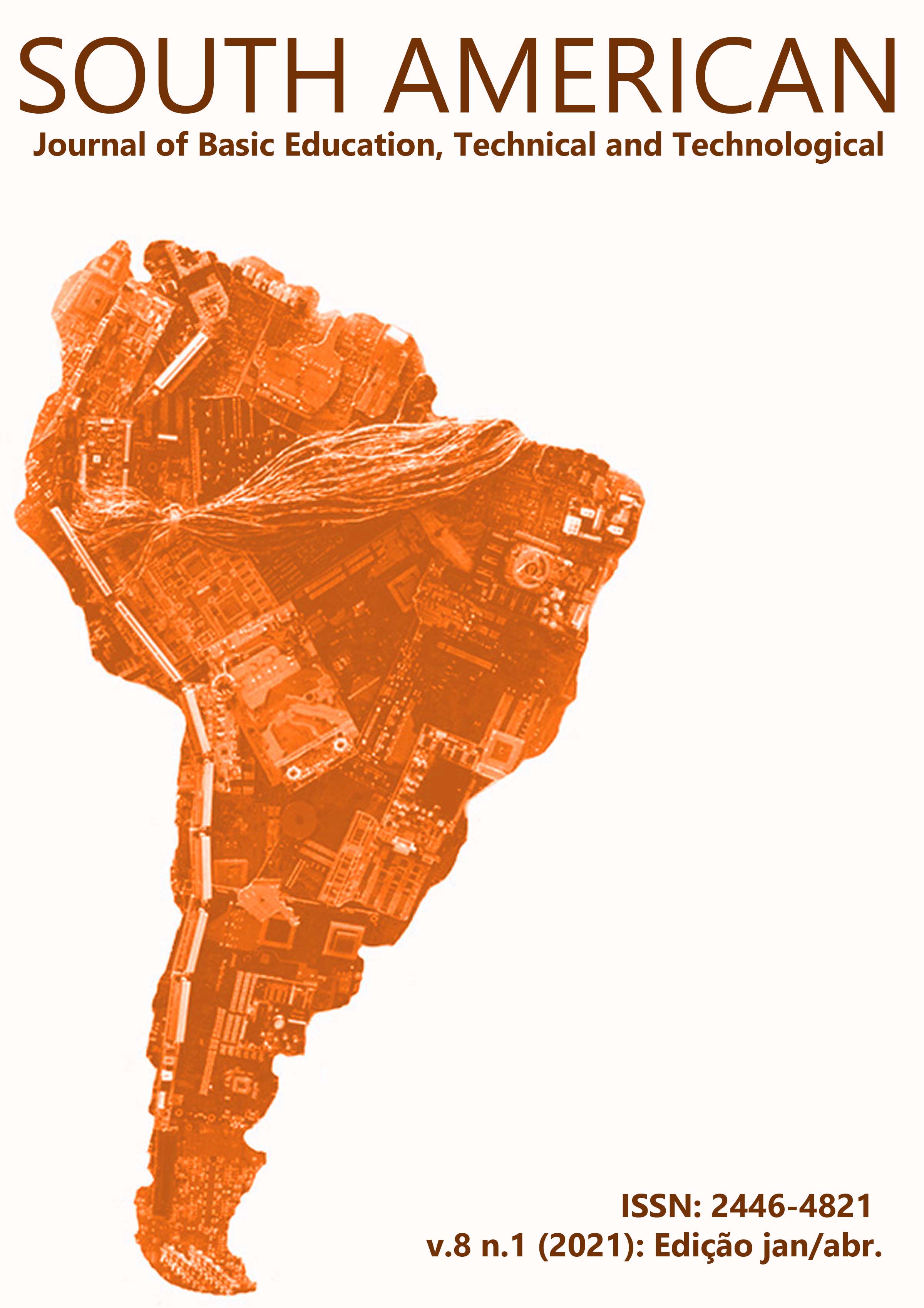EXPERIÊNCIAS INTERNACIONAIS COM A LESSON STUDY: EVIDÊNCIAS DE APRENDIZAGEM NA SALA DE AULA
Keywords:
Lesson Study. Learning. Evidence of learning. Learning theory.Abstract
This article is part of a broader meta-analysis underway at a university in Northern Brazil on theories and evidence of learning in studies centred on the methodology internationally known as Lesson Study (LS). Oriented by Systematic Review, this exploratory research sought to identify theories and evidence of learning in academic articles in English, published from 2016 to 2018, which pointed out the effectiveness of the LS methodology in teaching subject matter content at schools. For this purpose, 793 articles were reviewed as a result of searches performed with five combinations of descriptors on Google Scholar. After two elimination processes based on previously established criteria, three articles were retained for final analysis. In addition to the identification of a small number of articles that met the criteria, the research confirms the arguments of some authors that many studies involving LS focus on the teacher, leaving the investigation of student learning in the background, and that rigorous debates about learning theories are not common in these studies.
Downloads
References
[2] STIGLER, J. W.; HIEBERT, J. Understanding and improving classroom mathematics instruction. In: Australian Council for Educational Research. Raising Australian standards in mathematics and science: insights from TIMSS. Melbourne: ACER, p. 52-65, 1997. Disponível em: https://research.acer.edu.au/research_conference_1997/2/. Acesso em: 11 nov. 2020.
[3] STIGLER, H.; HIEBERT, J. The teaching gap: best ideas from the world’s teachers for improving education in the classroom. New York: The Free Press, 1999. Disponível em: https://www.researchgate.net/publication/44824783_The_teaching_gap_Best_ideas_from_the_world's_teachers_for_improving_education_in_the_classroom_New_York_NY_The_Free_Press. Acesso em: 11 nov. 2020.
[4] ELLIOTT, J. Significant themes in developing the theory and practice of lesson study. International Journal for Lesson and Learning Studies, v. 5, n. 4, p. 274-280, 2016. Disponível em: https://www.emeraldinsight.com/doi/full/10.1108/IJLLS-08-2016-0022. Acesso em: 11 nov. 2020.
[5] PANG, M. F.; MARTON, F. Beyond lesson study: comparing two ways of facilitating the grasp of some economic concepts. Instructional Science 31, p. 175-194, 2003. Disponível em: https://link.springer.com/content/pdf/10.1023%2FA%3A1023280619632.pdf. Acesso em: 11 nov. 2020.
[6] LARSSEN, D. L. S. et al. A literature review of lesson study in initial teacher education: perspectives about learning and observation. International Journal for Lesson and Learning Studies, v. 7, n. 1, p. 8-22, 2018. Disponível em: https://doi.org/10.1108/IJLLS-06-2017-0030. Acesso em: 11 nov. 2020.
[7] LO, M. The development of the learning study approach in classroom research in Hong Kong. Educational Research Journal, v. 24, n. 1, 2009. Disponível em: http://citeseerx.ist.psu.edu/viewdoc/download?doi=10.1.1.473.5329&rep=rep1&type=pdf. Acesso em: 11 nov. 2020.
[8] OLIVEIRA, K. L. S. J. Lesson study na formação inicial de professores: uma experiência com licenciandos de Letras-Inglês da Universidade Federal do Oeste do Pará. Santarém: UFOPA, 2018. Disponível em: http://www.ufopa.edu.br/ppge/images/dissertacoes/turma_2016/Ktia_Lais.pdf. Acesso em: 11. nov. 2020.
[9] OLIVEIRA, H. N. Lesson study: uma experiência com três professores de inglês da rede pública estadual em Santarém-PA. Santarém: UFOPA, 2018. Disponível em: https://sucupira.capes.gov.br/sucupira/public/consultas/coleta/trabalhoConclusao/viewTrabalhoConclusao.jsf?popup=true&id_trabalho=7061491. Acesso em: 11. nov. 2020.
[10] ISODA, M. et al (Ed). Japanese lesson study in mathematics: its impact, diversity and potential for educational improvement. Singapore: World Scientific, 2007.
[11] GILLIES, H. et al. Four teachers looking for a lesson: developing materials with lesson study. In: TOMLINSON, B.; MASUHARA, H. (Ed.). Research for materials development in language learning. London: Continuum, 2010, p. 237-250.
[12] LEWIS, C. Lesson study: the core of Japanese professional development. In: The Annual Meeting of the American Educational Research Association, 2000. Disponível em: https://eric.ed.gov/?id=ED444972. Acesso em: 11 nov. 2020.
[13] CHEUNG, W. M.; WONG, W. Y. Does lesson study work? A systematic review on the effects of lesson study and learning study on teachers and students. International Journal for Lesson and Learning Studies, v. 3, n.2, p.137-149, 2013. Disponível em: https://www.emeraldinsight.com/doi/full/10.1108/IJLLS-05-2013-0024. Acesso em: 11 nov. 2020.
[14] WOOD, P.; CAJKLER, W. A participatory approach to Lesson Study in higher education. International Journal for Lesson and Learning Studies, v. 5, n. 1, p. 4-18, 2016. Disponível em: https://doi.org/10.1108/IJLLS-08-2015-0027. Acesso em: 11 nov. 2020.
[15] RUNESSON, U. Pedagogical and learning theories and the improvement and development of lesson and learning studies. International Journal for Lesson and Learning Studies, v. 4, n. 3, p. 186-193, 2015. Disponível em: https://www.emeraldinsight.com/doi/full/10.1108/IJLLS-04-2015-0016. Acesso em: 11 nov. 2020.
[16] RUNESSON, U. Pedagogical and learning theories in lesson and learning studies – revisited. International Journal for Lesson and Learning Studies, v. 5, n. 4, p. 295-299, 2016. Disponível em: https://www.emeraldinsight.com/doi/full/10.1108/IJLLS-07-2016-0017. Acesso em: 11 nov. 2020.
[17] MARTON, Ference. Necessary conditions of learning. New York: Routledge, 2015.
[18] PETTICREW, M.; ROBERTS, H. Systematic reviews in the Social Sciences: a practical guide. Oxford: Blackwell Publishing, 2006.
[19] DARMAWAN, E. et al. SIMAS ERI learning model based on lesson study to increase student motivation and learning outcomes. International Journal of Research and Review, v. 4, n. 4, p. 40-47, 2017. Disponível em: https://www.researchgate.net/publication/317065815_SIMAS_ERI_Learning_Model_Based_on_Lesson_Study_to_Increase_Student_Motivation_and_Learning_Outcomes. Acesso em: 11 nov. 2020.
[20] LEONG, S. S. M. et al. Using lesson study to enhance meaningful understanding on the topic of pressure. International Journal of Environmental and Science Education, v. 11, n. 15, p. 8425-8437, 2016. Disponível em: https://eric.ed.gov/?id=EJ1118023. Acesso em: 11 nov. 2020.
[21] NOFRION, N. et al. Effectiveness of EXO OLO TASK learning model based on Lesson Study in Geography learning. IOP Conference Series - Earth and Environmental Science, 145, 2018. Disponível em: http://iopscience.iop.org/article/10.1088/1755-1315/145/1/012038/meta. Acesso em: 11 nov. 2020.
[22] VYGOTSKY, L. Thought and language. Edited and translated by Eugenia Hanfmann, Gertrude Vakar, and Alex Kozulin. Cambridge, Mass.: The MIT Press, 2012.
[23] PIAGET, J. The language and thought of the child. New York: Harcourt, Brace,
Jovanovich, 1926.
[24] ROCHELLE, J.; TEASLEY, S. D. The construction of shared knowledge in collaborative problem solving. In: O’MALLEY, C. (Ed.). Computer supported collaborative learning. Berlin: Springer, 1995, p. 69-97.
[25] FAWCETT, L. M.; GARTON, A. F. The effect of peer collection on children’s problem-solving ability. British Journal of Educational Psychology, v. 75, n. 2, p. 157-169, 2005. DOI: 10.1348/000709904X23411
Disponível em: http://content.ebscohost.com/ContentServer.asp?T=P&P=AN&K=17535469&S=R&D=aph&EbscoContent=dGJyMNXb4kSep684zOX0OLCmsEiep7RSsqy4SLeWxWXS&ContentCustomer=dGJyMOzpsEmzrLBJuePfgeyx44Dt6fIA. Acesso em: 11 nov. 2020.
Downloads
Published
Versions
- 2021-07-06 (2)
- 2021-06-29 (1)










